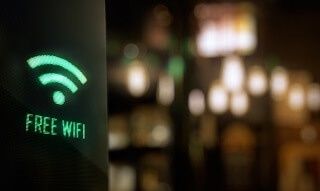The Risks of Public WiFi
When you're on your home network, you can see your other online devices and share information between them. A public network isn't much different. Although you may not have sharing turned on, there are several ways hackers can steal your information.
Man-in-the-Middle Attacks
In a man-in-the-middle attack, the hacker gets between you and the server you're trying to connect to. In this attack, when you enter your password on a website, it doesn't go straight to the website's server.
Your password goes to the hacker who reads it and sends it on to the website's server. When the website's server gets your password, it thinks it's coming straight from you and sends the hacker your account data.
Because the hacker then forwards the account data to you, you never know you've been compromised until it's too late.
Eavesdropping
Most of the information your computer sends and receives isn't encrypted or uses only a low level of encryption. This allows virtual eavesdropping that works in the same way it does in the real world.
Your device is essentially talking quietly or whispering to the WiFi hotspot and hoping that nobody else is listening in. Unfortunately, it's much harder to tell that a hacker is using their laptop to eavesdrop on your digital conversation than it is to tell if a nosy busybody is leaning in to listen to your real-world conversation.
Malware
Malware is malicious software that tries to access your confidential data or change the way your device operates. It might install annoying pop-up ads or bypass your security settings so hackers can more easily intercept your data.
Some malware can be avoided in the same way you'd avoid computer viruses -- by only downloading things from trusted sources. However, hackers are also able to put up fake web pages on a network so that when you think you're downloading from a trusted source, you're really downloading a hacker's malware.
Background Data
Many people try to eliminate their risks by not doing anything sensitive on public networks. This doesn't work if your email, social network and financial apps are syncing in the background while you read the news. Also, remember that many seemingly safe websites borrow your Facebook, Google or other logins that you want to keep private.
How to Protect Yourself if You Have to Get Online While On the Go
If you need to get online while you're away from home, there are a number of steps you can take to protect yourself.
Use Known Networks
Always verify the name of the network by looking for a sign or asking an employee before you connect to free WiFi. Hackers often set up fake networks so they can easily capture your data.
Set your devices to ask you before joining new networks so they don't automatically connect to an unsafe network.
Run Anti-Virus Software
Anti-virus software blocks malware, so it's a must when you use public networks. Use it on all of your devices to prevent malware from spreading when you sync them at home.
Use a VPN
VPN stands for Virtual Private Network. It's a special piece of software that encrypts your data before it's sent over a public network so that it's much harder for hackers to read it. Many employers and universities offer this software for free.
Use SSL Connections
Finally, when you connect to websites that ask for a password or other information, make sure they say "https://" at the start of the web address and not "http://". HTTPS addresses have built-in security that adds additional protection in case your other security steps fail.
Resources:
http://www.veracode.com/security/man-middle-attack
http://www.pcadvisor.co.uk/how-to/network-wifi/how-reset-your-router-rid-it-of-malware-3595477/
http://usa.kaspersky.com/internet-security-center/internet-safety/public-wifi-risks#.V7SqbrX7CRx
